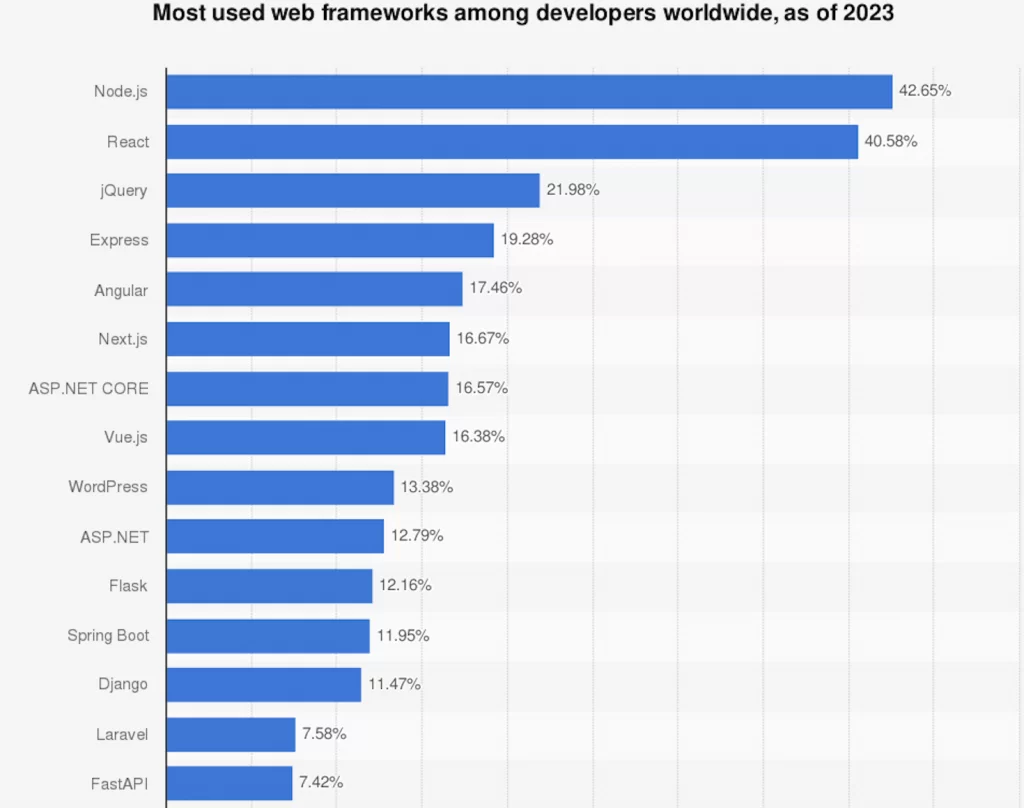Embracing Node.js, a dynamic runtime environment, leads to web development excellence. Unlock its potential with adherence to best practices. This guide explores key Node.js principles, from project structure to performance optimization. Gain insights into dependency management, synchronous power, and error handling, enhancing development, scalability, and reliability. Whether a seasoned pro or a novice, mastering these practices is crucial for unmatched Node.js applications.
What is Node.js?
Node.js, often simply referred to as Node, is an open-source, server-side JavaScript runtime environment. It allows developers to build and execute server-side applications using JavaScript, which is traditionally associated with front-end web development. Node.js is built on the V8 JavaScript engine developed by Google, making it highly efficient and fast.
One of the key features of Node.js is its event-driven, non-blocking I/O model, which enables it to handle a large number of concurrent connections without becoming bogged down by waiting for I/O operations to complete. This makes Node.js particularly well-suited for building scalable and real-time applications, such as web servers, APIs, and chat applications.
How to Hire Node.js Developers?
Hiring Node.js developers requires a strategic approach to ensure you find the right candidates who not only possess the necessary technical skills but also fit well with your team and project requirements. Here’s a step-by-step guide to help you navigate the hiring process effectively:
Define Your Hiring Needs:
Before you start searching for candidates, clearly outline your project’s requirements. Determine the scope of work, technical skills needed (such as proficiency in Node.js, JavaScript, and relevant frameworks), and any additional expertise required for your specific project.
Craft an Engaging Job Description:
Write a comprehensive job description that not only outlines the technical skills you’re looking for but also highlights the company culture and values. Emphasize the exciting aspects of the project, opportunities for growth, and any unique challenges that the developer will face.
Source Candidates:
Utilize various channels to source candidates. Post the job on your company website, job boards, and professional networking sites like LinkedIn. Additionally, consider tapping into tech communities, forums, and social media groups to identify potential candidates.
Screen Resumes and Portfolios:
Review resumes to shortlist candidates who meet the technical requirements. Pay attention to their previous Node.js projects, coding style, and the complexity of the projects they’ve handled. A strong portfolio indicates a developer’s practical expertise.
Conduct Technical Assessments:
Administer technical assessments or coding tests that reflect the real-world challenges the developer might face on your project. These assessments could include tasks like solving coding problems, debugging, or building small components related to your application.
Evaluate Soft Skills:
Technical skills are essential, but don’t overlook soft skills. Node.js developers need to work collaboratively, communicate effectively, and adapt to evolving project requirements. Conduct interviews that assess their problem-solving abilities, teamwork, and communication skills.
Types of Node.js Developers
When looking to hire Node.js developers, you have several options to consider based on your project’s scope, budget, and timeline. Here are three common types of Node.js developers you might encounter:
In-House Expert:
An in-house Node.js developer is a full-time employee who works directly for your company. This option is ideal for long-term projects or ongoing development needs. In-house developers are deeply integrated into your team, allowing for seamless collaboration, regular communication, and a strong understanding of your company’s goals and culture. They contribute not only to the development but also to the overall growth of your organization.
Advantages:
- Direct and consistent communication.
- Deep understanding of your project and company.
- Full-time commitment to your project.
- Easier to manage and collaborate on complex projects.
Challenges:
- Higher cost due to salary, benefits, and overhead.
- Limited flexibility in scaling up or down based on project demands.
Freelancer:
Freelance Node.js developers work on a contract basis and are hired for specific projects or tasks. This option is suitable for short-term projects, one-time development needs, or when you require specialized skills for a limited duration. Freelancers offer flexibility and can be a cost-effective solution, but they might not be as deeply integrated into your team as in-house developers.
Advantages:
- Flexibility to hire for specific tasks or projects.
- Potentially lower cost compared to full-time employees.
- Access to specialized skills for short-term needs.
Challenges:
- Limited availability, especially for ongoing projects.
- Communication challenges due to remote work.
- Potentially less commitment to your project’s long-term success.
Outsource:
Outsourcing involves partnering with a third-party development company or agency to handle your Node.js development needs. This option is beneficial when you want to leverage a team with diverse skills and expertise without the overhead of managing an in-house team. Outsourcing is suitable for projects with defined scopes and allows you to focus on other aspects of your business.
Advantages:
- Access to a team with a range of skills.
- Cost savings compared to maintaining an in-house team.
- Reduced administrative and managerial overhead.
Challenges:
- Communication challenges, especially if the outsourcing team is in a different time zone.
- Limited control over the development process.
- Potential concerns about data security and confidentiality.
Here are the most utilized web frameworks among developers worldwide as of 2023. Node.js occupies the majority of the percentage, as depicted in the image below. It’s evident that Node.js holds a prominent position in the preferences of developers.

Writing an Effective Job Description for Node.js Developers
Crafting an impactful job description for Node.js developers is a strategic process. Begin with a clear job title that encapsulates the role’s essence, followed by a succinct job summary that highlights its importance within the company’s ecosystem. Present the core responsibilities using bullet points, underscoring tasks like creating applications and collaborating across teams. Outline the mandatory skills such as adeptness in Node.js and familiarity with relevant frameworks. Specify the preferred level of experience and any required educational qualifications.
Incorporate a glimpse of your company’s culture and benefits to attract potential candidates. Provide a seamless application process, including the necessary documents and any specific assessment steps. By including an equal opportunity statement, you reinforce your commitment to diversity and inclusion. Finally, ensure that contact information is readily available for candidates to reach out with inquiries. By meticulously composing each section, you’ll fashion a compelling job description that resonates with skilled Node.js developers and entices them to join your team.
Also Read: Node.JS Interview Questions
Suitable Hiring Models for Node.js Developers
Selecting the right hiring model for Node.js developers is crucial to ensure a seamless collaboration that aligns with your project’s needs. Here are three suitable hiring models to consider:
Fixed Pricing Model:
Ideal for well-defined projects with clear scope and requirements. With a fixed pricing model, you agree on a predetermined cost for the entire project. This model provides budget predictability and is suitable for projects where the scope is unlikely to change significantly. It’s essential to have a comprehensive project plan to avoid scope creep.
Dedicated Hiring Model:
A dedicated hiring model involves hiring Node.js developers who work exclusively on your project. This model offers high flexibility, as you can scale the team up or down as needed. Dedicated developers become an integral part of your in-house team, ensuring close collaboration, communication, and alignment with your project’s goals.
Time & Material Model:
The time and material model is suitable for projects with evolving requirements. You pay based on the time spent and resources utilized. This model provides flexibility to adapt to changes during development, making it a good fit for projects where requirements might evolve based on user feedback or market trends.
Where to Find Node.js Developers
When seeking talented Node.js developers, consider these platforms and strategies to locate the right candidates:
Online Job Boards:
Post your job openings on popular job boards like LinkedIn, Indeed, and Glassdoor. These platforms have broad reach and allow you to target specific skills, making it easier to find suitable candidates.
Tech-Specific Job Boards:
Utilize tech-focused job boards such as Stack Overflow Jobs and GitHub Jobs. These platforms attract developers with a strong technical background, including Node.js expertise.
Professional Networking Sites:
Explore LinkedIn to connect with Node.js developers in your network or join relevant tech groups and communities. This enables you to identify potential candidates and build relationships with them.
Freelance Platforms:
For short-term projects, platforms like Upwork and Freelancer can help you find experienced Node.js freelancers. Review profiles, ratings, and previous work to gauge their suitability.
GitHub and GitLab:
Search code repositories on GitHub and GitLab for projects related to Node.js. This can give you insights into the coding style, quality, and technical skills of potential candidates.
Top Node.js Service Providers
When it comes to outsourcing Node.js development or seeking professional services, there are several reputable companies and service providers known for their expertise in Node.js development. Here are some of the top Node.js service providers to consider:
Toptal:
Toptal is known for connecting businesses with top-tier freelance Node.js developers and other tech experts. They have a rigorous screening process to ensure that only the top 3% of applicants are accepted into their talent pool.
GeekyAnts:
GeekyAnts is a tech-focused company renowned for its expertise in Node.js development. With a strong portfolio spanning web and mobile app development, they offer frontend and backend solutions along with UI/UX design and product consulting. Their commitment to innovative solutions and open-source contributions makes them a noteworthy choice for Node.js projects.
Cognizant:
Cognizant is a global technology consulting firm that offers Node.js development services. They provide end-to-end solutions, including application development, modernization, and integration, for various industries.
ThoughtWorks:
ThoughtWorks is renowned for its software consulting and development services. They have experience with Node.js and offer solutions for building scalable and performant applications.
EPAM Systems:
EPAM is a software engineering and IT consulting company that provides Node.js development services. They focus on digital transformation, design, and delivery of innovative solutions.
Intertech:
Intertech is a software consulting and training company with expertise in Node.js development. They offer services ranging from application development to consulting and training.
Conclusion
In the dynamic landscape of software development, securing top-tier Node.js developers in the US is essential for driving innovation and building robust applications. The journey of hiring these professionals involves a comprehensive approach that encompasses crafting compelling job descriptions, utilizing diverse recruitment channels, and evaluating candidates based on technical proficiency, problem-solving skills, and cultural alignment. Whether you’re seeking in-house experts, freelancers, or outsourcing solutions, the goal remains the same: to find individuals who can navigate the intricacies of Node.js, contribute to your projects’ success, and seamlessly integrate with your development team.
By leveraging a mix of online platforms, networking events, and industry-specific resources, businesses can tap into a pool of skilled Node.js developers who possess the expertise required to bring digital visions to life. With the right approach, your search for the perfect Node.js developers can yield talent that not only meets but exceeds your project’s expectations, driving your organization toward continuous growth and achievement.
















Hi to all, the contents existing at this site are
really amazing for people experience, well, keep up the good
work fellows.